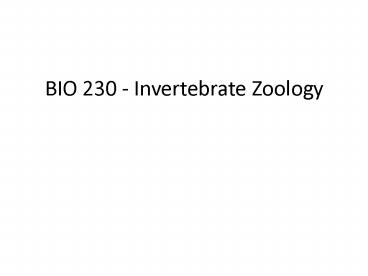BIO 230 - Invertebrate Zoology - PowerPoint PPT Presentation
1 / 21
Title:
BIO 230 - Invertebrate Zoology
Description:
BIO 230 - Invertebrate Zoology aka: Everything you ever wanted to know (and some stuff you didn t) about the little things that run the Earth. – PowerPoint PPT presentation
Number of Views:190
Avg rating:3.0/5.0
Title: BIO 230 - Invertebrate Zoology
1
BIO 230 - Invertebrate Zoology
- aka Everything you ever wanted to know (and
some stuff you didnt) about the little things
that run the Earth.
2
Classification of Life
- Kids Playing Chicken On Freeways Get Squished
- What does this mean?
- Lets start from the bottom
3
Classification of Life
- 3 Domains are Bacteria, Archaea, Eukarya
- Bacteria/Archaea have prokaryotic cell types
- No nucleus
- No cytoskeleton
- No membrane-bound organelles
- Eukaryotes
- Both unicellular and multicellular
- Nuclei, cytoskeleton, and organelles present
4
(No Transcript)
5
Classification Kingdoms of Eukarya
- Protozoa (often called Protista)
- Euglena, Amoeba, etc.
- Plantae
- Fungi
- Animalia
6
Fungi
- Unicellular or Multicellular
- Eukaryote
- Non-motile
- Heterotrophs no photosynthesis
- Have a cell wall
- A subject of this class?
7
Plantae
- Multicellular
- Autotrophs
- Non-motile
- Eukaryotes
- Have a cell wall (cellulose)
- A subject of this class?
8
Animalia
- Multicellular
- Heterotrophs
- Eukaryotes
- Most are motile
- No cell wall
- A subject of this class?
9
Protozoa
- Mostly Unicellular
- Many are colonial, many motile
- Can be photosynthetic (autotrophs)
- Some have a cell wall
- A subject of this class?
Euglena
Amoeba
10
So, what is an invertebrate?
- It definitely includes animals
11
- that simply lack vertebra (no true backbone)
12
But
- Protists (amoeba, paramecium, euglena) blur the
line between animal and plant - So we will consider organisms in Kingdoms
Animalia Protozoa - But mostly Animalia
13
Who cares about inverts?
- You should.
- Comprise about 98 of animal life on Earth
- Vertebrates 40,000 species
- Inverts 2 million described but as many as 8
million still undescribed - Found in basically all environments
14
Inverts
- Incredibly diverse
- Most small but
- Giant squid - 60 ft long gt4,000 lbs
- Ribbon worms (nemerteans) can grow up to 180 ft
long - At the other end, rotifers mostly lt0.001 mm
smaller than some bacteria
15
Inverts
- Form part of the foundation of most food webs
- Pollinate flowers crops
- Cycle nutrients waste materials
- Important food sources
- Basically form the backbone of most ecosystems
16
- If human beings were not so impressed by size
alone, they would consider an ant more wonderful
than a rhinoceros." - "If invertebrates become extinct, the world as we
know it would cease to exist." - . the little things run the world.
- -- E.O. Wilson
- Professor Emeritus
- Harvard University
17
Diversity of Invertebrates
- Major Invertebrate Environments
- Marine
- Estuaries
- Freshwater
- Terrestrial
- Host organisms
18
Diversity of Invertebrates
- Land ca. 22 of surface area
- Water ca. 78
- Oceans - 97.3
- Lakes, ponds, reservoirs (lentic) - 0.009
- Rivers (lotic)
- So, not surprisingly most of invertebrate
diversity is in the oceans - Why else might this be?
19
Life on land is challenging!
- Water...
- allows simple gas exchange across body surface
(simpler respiration systems) - prevents dehydration (no need for systems to
prevent this e.g. worm mucus) - provides movement of sperm and egg and allows for
external fertilization - flushes away waste
- is a versatile solvent makes nutrients
available - is less dense than air no need for rigid
support and allows easy movement - has high specific heat so temps are more stable
20
But
- Light is in much shorter supply (extinguishes
over a shorter distance) - reduces primary productivity
- Air carries more oxygen than air
- Oxygen moves 30,000x faster in air
- Non-moving aquatic organisms need water flow!
- Water much more viscous so increases drag on
larger animals - Water sources collect wastes
21
Influences on Invert Diversity
Property Air Water
Humidity High Low
Density High Low
Specific Heat High Low
O2 solubility Low High
O2 diffusion Low High
Nutrient content High Low
Light Extinction High Low































